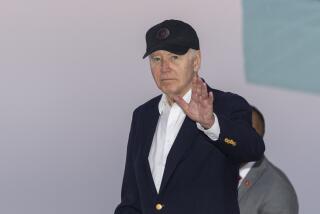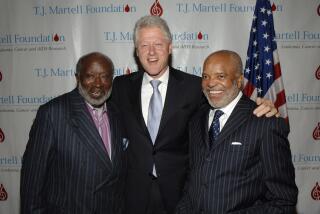Jackson’s Party Man
For Larkin Arnold, the irony’s too delicious: He expects to raise $100,000 today for presidential hopeful Jesse Jackson “right around the corner” from the Bel-Air mansion where Nancy and Ronald Reagan will retire next year.
“I lived here before they did,” entertainment attorney-manager Arnold said with a laugh in an interview this week. “And that’s the truth.”
About 850 persons--many of whom make up a virtual Who’s Who of Black Hollywood--will pay up to $1,000 each to attend Arnold and wife Cynthia’s Bel-Air garden party fund-raiser and share smiles with Danny Glover and Lou Gossett Jr., the Jacksons (sans brother Michael), Quincy Jones, Jayne Kennedy, Robert Guillaume, Cleavon Little, Cicely Tyson and Alfre Woodard.
Assembly Speaker--and Jackson campaign honcho--Willie Brown will be there, as will state Assemblywoman Maxine Waters and what Arnold calls a “cross section of the black upper-middle class.”
That’s a term that certainly fits Arnold. Until last year he was a CBS Records senior vice president who many inside the business considered one of the most powerful black executives in music. He is widely credited with developing Luther Vandross’ solo career and bringing Marvin Gaye to CBS.
Today, Arnold, 45, counts among his clients “The Cosby Show’s” Phylicia Rashad, “A Different World’s” Jasmine Guy, “Fame’s” Debbie Allen, actor Dorian Harewood and the Jacksons singing group.
“The business has definitely changed and improved since I started in 1969,” Arnold said. “There are more jobs and better pay for blacks, but, as with the presidency, there’s some reluctance to name a black president of a record company.”
Arnold broke into the business managing a Washington nightclub while paying his way through Howard University Law School. He eventually wound up with a string of part-time jobs on Capitol Hill, where his political activism was nurtured in a front-row seat on the 1960s.
“It was an exciting, exhilarating time to be in Washington,” Arnold recalled. “It instilled in me a sense that politicians are basically just human beings. I got a chance to see a lot of their frailties, shortcomings, and I learned that an individual can make a difference, if he is willing to work hard and sacrifice, so this gives me an opportunity to pay some of that back.”
More to Read
Get the L.A. Times Politics newsletter
Deeply reported insights into legislation, politics and policy from Sacramento, Washington and beyond. In your inbox three times per week.
You may occasionally receive promotional content from the Los Angeles Times.










